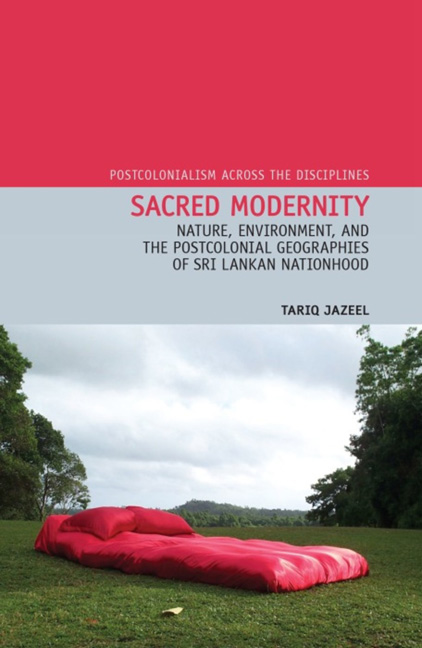Book contents
- Frontmatter
- Dedication
- Contents
- List of Map and Figures
- Acknowledgements
- Introduction
- 1 Sacred Modernity: Nature, Religion, and the Politics of Aesthetics
- Part I Ruhuna (Yala) National Park
- 2 Landscape, Nature, Nationhood: A Historical Geography of Ruhuna (Yala) National Park
- 3 Inscription and Experience: The Politics and Aesthetics of Nature Tourism
- 4 Political Geographies: Promoting, Contesting, and Purifying Nature
- Part II Tropical Modern Architecture
- Conclusion: Sri Lankan Nature as Problem Space
- Bibliography
- Index
4 - Political Geographies: Promoting, Contesting, and Purifying Nature
from Part I - Ruhuna (Yala) National Park
- Frontmatter
- Dedication
- Contents
- List of Map and Figures
- Acknowledgements
- Introduction
- 1 Sacred Modernity: Nature, Religion, and the Politics of Aesthetics
- Part I Ruhuna (Yala) National Park
- 2 Landscape, Nature, Nationhood: A Historical Geography of Ruhuna (Yala) National Park
- 3 Inscription and Experience: The Politics and Aesthetics of Nature Tourism
- 4 Political Geographies: Promoting, Contesting, and Purifying Nature
- Part II Tropical Modern Architecture
- Conclusion: Sri Lankan Nature as Problem Space
- Bibliography
- Index
Summary
The last two chapters have evoked the historical striations and aesthetic terrains of Ruhuna National Park, stressing how together they constitute a politics of nationness instantiated through landscape and nature. In the next part of the book, I go on to suggest how aesthetic practices in Sri Lanka's contemporary architectural modernism similarly constitute a cosmopolitan Sinhala-Buddhist nationalism. In both instances - park and architecture - the politics of nature lies in the structures of feeling that both sites spatialize. In Ruhuna National Park, however, there is also a more obvious political, and politicized, geography that this chapter works to tease out, because during Sri Lanka's civil war Ruhuna's landscape geographies were not uncontested.
In this Chapter I focus on the contestation and securitization of Ruhuna National Park during the 1990s and early 2000s, tracing some of the public debates, physical struggles, and semiotic slippages surrounding the park. As I show, these connect directly to deeper social and political anxieties regarding struggles over ethnicity, belonging, and quite literally the nature of the national in the context of Sri Lanka's civil war. Despite the park's popularity, complex and fraught issues of popular and practical concern have affected Ruhuna in the last tw enty or so years. Through various contestations around wildlife and security particularly, it is possible to see, and indeed feel, some of the many tensions in Sri Lanka's contested contemporary politics of nationness and belonging. In this chapter, I connectpractical issues concerning park management and security in the 1990s up to broader political and social anxieties over the fragmentation of the nation state in the face of Tamil separatism, as well as the accommodation of non-Sinhala-Buddhist sacred practice in Ruhuna's semiotically purified national landscapes. Specifically, and in turn, I regard debates about the park's security following LTTE attacks during the 1990s, as well as concerns about the routing of east coast Tamils through Ruhuna on their annual pilgrimages to the adjoining holy site, the Kataragama Sanctuary.
These contestations and struggles over meaning and security must be taken in the context of a continued, quite aggressive promotion of Ruhuna as a national space of Sinhala-Buddhist heritage for a particular vision of the national populace through the second half of the last century.
- Type
- Chapter
- Information
- Sacred ModernityNature, Environment and the Postcolonial Geographies of Sri Lankan Nationhood, pp. 72 - 92Publisher: Liverpool University PressPrint publication year: 2013



